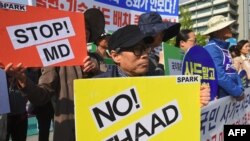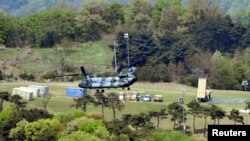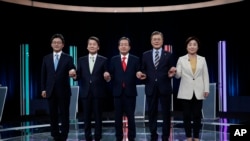President Donald Trump’s recent criticisms of South Korea, regarding THAAD and trade, could lead to a rupture in the Seoul-Washington alliance, especially if, as expected, the liberal leaning presidential candidate Moon Jae-in wins next week’s presidential election.
On Sunday, Trump's national security adviser, H.R. McMaster seemed to play down the president’s recent demand that South Korea pay $1 billion for the U.S. Terminal High Altitude Defense (THAAD) anti-missile battery currently being deployed in the rural southeastern region of the Korean Peninsula.
Defense cost sharing
McMaster spoke on Sunday with Kim Kwan-jin, the Chief of the National Security Office in South Korea, about the Seoul government’s strong objections to changing the THAAD deal made last year, in which the U.S. agreed to deploy the anti-missile battery and South Korea agreed to provide the land, infrastructure and cover operational costs.
According to a statement put out by the South Korean presidential office, the two national security advisers “reconfirmed” that the THAAD deal remains unchanged but that McMaster explained Trump’s $1 billion THAAD demand is “in line with the U.S. public expectations on defense cost burden-sharing with allies.”
During the U.S. presidential campaign Trump strongly criticized South Korea and other allies for paying less than their fair share for added security they get from the American forces stationed in their countries.
The U.S., South Korea Status of Forces Agreement (SOFA) that sets defense sharing costs is up for renewal in 2019. Under the current SOFA Seoul reportedly pays over $866 million annually to Washington for the more than 28,000 American troops, including military bases, and advanced weaponry systems deployed on the Korean Peninsula.
The South Korean Defense Ministry Monday declined to comment on whether Seoul is prepared to significantly increase it’s defense contributions to cover Trump’s $1 Billion THAAD demand when the new SOFA negotiations begin next year.
China praise
In addition to demanding South Korea pay $1 billion for THAAD, Trump also complained in an interview last week about the U.S.-South Korea free trade agreement that he called “horrible" and said “we are going to renegotiate that deal or terminate it."
Trump criticisms of a key regional U.S. ally came in contrast to his praise of China for increasing economic sanctions to restrain North Korea from further nuclear tests. The president also said he would reward Beijing’s cooperation by refraining from declaring China a currency manipulator, as he said he would during the campaign.
"Can you imagine if I say [to China],” Trump said in an interview with CBS’s Face The Nation Sunday, “Hey, by the way, how are you doing with North Korea? Also, we're going to announce that you're a currency manipulator tomorrow.”
In the same interview the president called North Korea leader Kim Jong Un a "pretty smart cookie" for being able to consolidate power of the repressive regime at a young age.
The U.S. president’s changing positions, going soft on an adversary but tough on a close and long-standing regional ally, could add fuel to building resentment among South Koreans over his THAAD demand.
The Korea Herald, in an editorial Monday, said Trump, “places the dollar value of the weapon over the spirit of the alliance.”
And The Korea Times ran similar editorial critique saying, “It is time for Korea to prepare effective countermeasures to deal with Trump’s unpredictable policies.”
Election impact
Trump’s THAAD and trade criticisms come as South Korea prepares for an early presidential election, scheduled for May 9, that was brought on by the impeachment of the former President Park Geun-hye for her alleged involvement in a multi-million dollar corruption scandal.
The leading presidential candidate, Moon Jae-in, with the liberal leaning Democratic Party of Korea, had long called for the deployment of the U.S. advance anti-missile system to be delayed until the new president takes office. While he voices strong support for the U.S. alliance, Moon’s positions, on increasing dialogue and economic engagement with North Korea differ from Washington’s hardline support for increased sanctions and emphasis that a military option would be used if needed.
South Korean independent political analyst Hwang Tae-soon said Trump’s comments may have been meant to send a stern message to Moon to follow U.S. policy or pay a high financial price.
“I think the U.S. has a political intention to train South Korea before new administration comes in,” he said.
However Hwang said the public criticism will likely backfire, and help Moon gain support with the electorate.
On Monday, the Democratic Party candidate moved up to a 46 percent approval rating in a Media Today – STI opinion poll. His closest rival centrist Ahn Cheol-soo with the People’s Party dropped to 19 percent and the conservative Liberty Korea Party candidate Hong Joon-pyo is in third place at 17 percent.
Youmi Kim contributed to this report.







